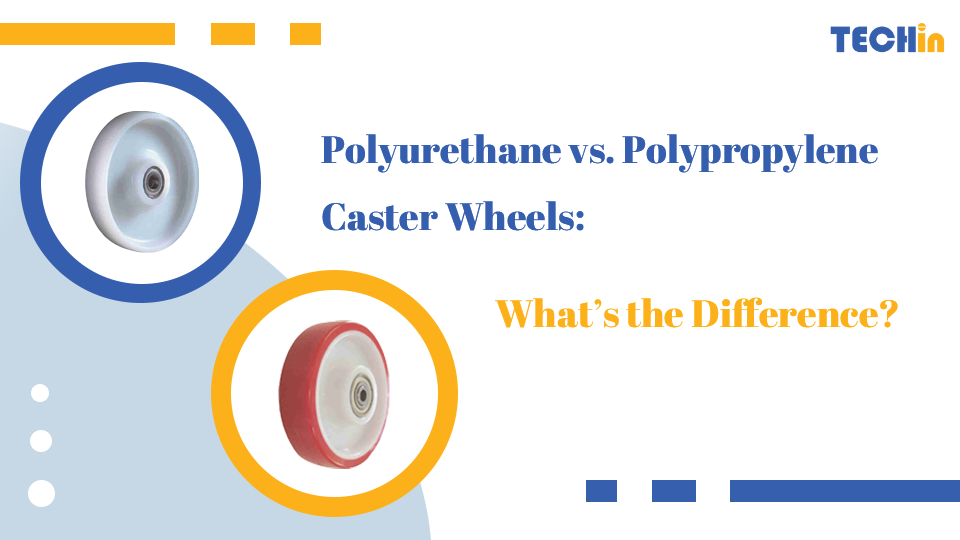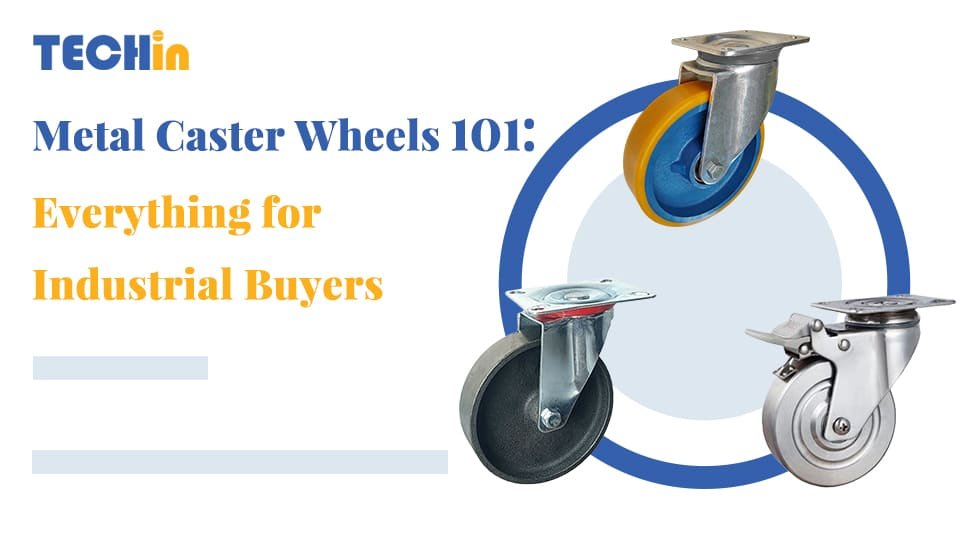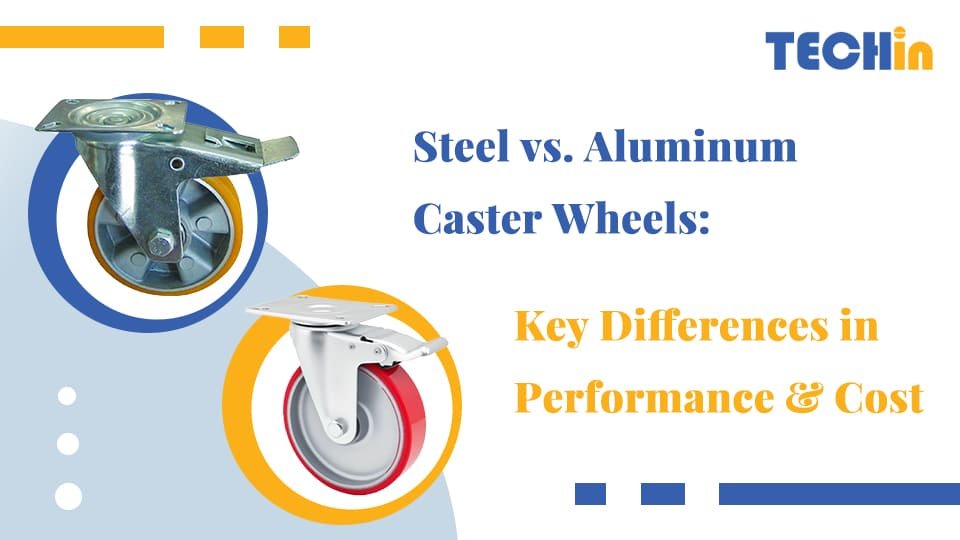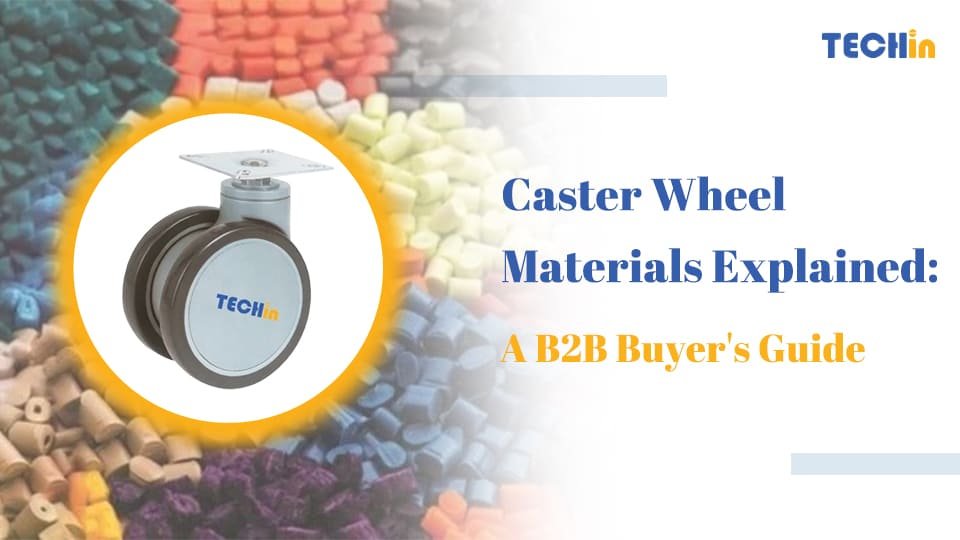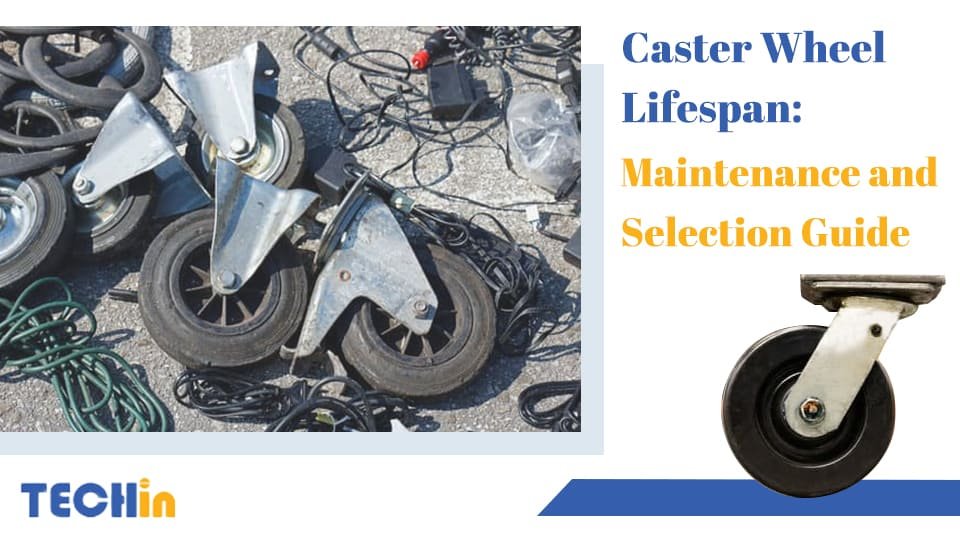Introduction
We understand that selecting the right caster wheel material can be a challenge. You’re often deciding between polyurethane and polypropylene, and each has distinct advantages. Making the right choice ensures durability and protects your investment, while the wrong one can lead to premature wear or floor damage. This guide is here to clarify the differences, making your decision straightforward and effective.
Polyurethane caster wheels offer superior durability and floor protection, making them ideal for heavy-duty or noise-sensitive environments. In contrast, polypropylene caster wheels are a lightweight, cost-effective solution with excellent chemical resistance, best suited for light-duty applications. The primary difference lies in long-term performance versus upfront cost—polyurethane is built for endurance, while polypropylene excels in less demanding, budget-conscious scenarios.
Now, let’s take a closer look at the specifics of each wheel type, including their pros and cons, to help you determine which is the right fit for your operations.
What are Polyurethane wheels?
Polyurethane wheels are crafted from a unique polymer that combines the strength of rigid plastic with the elasticity of rubber. They are engineered to handle heavy loads, protect floor surfaces, and minimize operational noise. This makes them a preferred choice in demanding environments like warehouses, medical facilities, supermarkets, and for industrial machinery.
For enhanced performance, they are often equipped with bearings to ensure smoother, more efficient rolling under heavy loads.
What are Polypropylene wheels?
Polypropylene (PP) wheels are known for being lightweight, rigid, and highly resistant to a wide range of chemicals, oils, and solvents. They are a common choice for light-duty applications, including utility carts, trolleys, office furniture, and other equipment that doesn’t carry significant weight.
However, polypropylene wheels are more brittle and tend to be noisier on hard surfaces. They are most valuable in settings where chemical resistance and cost-efficiency are the highest priorities.
What are the advantages and disadvantages of polyurethane wheels?
Advantages
- Durability: Excellent wear and abrasion resistance, even on rough surfaces.
- Load Capacity: Capable of supporting heavy loads without compression or damage.
- Floor Protection: The soft tread is non-marking and prevents scratches on sensitive floors.
- Noise Reduction: Absorbs impacts and vibrations for quieter operation.
- Versatility: Performs reliably in both indoor and outdoor settings.
Disadvantages
- Price: Typically involves a higher initial investment than polypropylene.
- Chemical Sensitivity: Can be susceptible to degradation from strong solvents or acids.
- Heavier: The dense material adds more weight to the equipment.
What are the advantages and disadvantages of Polypropylene wheels?
Advantages
- Lightweight: Reduces the overall weight of equipment, making it easier to maneuver.
- Economical: A budget-friendly option, particularly for large-scale procurement.
- Chemical Resistance: Outstanding performance when exposed to acids, bases, and solvents.
- Non-absorbent: Does not absorb moisture, making it suitable for damp environments.
Disadvantages
- Durability: More prone to wear and cracking on rough or uneven terrain.
- Noise: Generates more noise during rolling compared to softer materials.
- Load Capacity: Limited weight tolerance, making it unsuitable for heavy-duty use.
- Surface Impact: The hard material can potentially damage delicate floor surfaces.
What is the difference between polyurethane and polypropylene wheels?
The core differences between the two materials can be summarized as follows:
| Feature | Polyurethane Wheels | Polypropylene Wheels |
|---|---|---|
| Durability | Long-lasting, wear-resistant | Wears quickly on rough surfaces |
| Load Capacity | High, suitable for heavy-duty | Low, best for light-duty |
| Noise Level | Quiet, shock-absorbing | Noisy, hard surface rolling |
| Floor Impact | Gentle, non-marking | Can scratch or damage floors |
| Chemical Resistance | Moderate | Excellent |
| Price | Higher upfront cost | Lower upfront cost |
| Best Use | Warehouses, machinery, supermarkets | Furniture, carts, chemical-heavy areas |
This positions polyurethane as the premium choice for long-term performance, while polypropylene serves as the economical solution for specific, less demanding applications.
Are polyurethane wheels quiet?
Yes. Polyurethane wheels are significantly quieter than their polypropylene counterparts. Their softer, shock-absorbing composition dampens vibrations and reduces the noise generated when rolling across hard surfaces. This makes them an excellent choice for environments where noise control is a priority, such as hospitals, offices, and retail spaces.
How can I choose from polyurethane and polypropylene wheels?
Use this simple guide to determine the best fit for your needs:
- Choose polyurethane wheels if your application requires maximum durability and high load capacity.
- Choose polypropylene wheels if your primary concerns are low initial cost and chemical resistance.
- For noise-sensitive environments like hospitals or offices, polyurethane is the better option.
- For light-duty projects with budget constraints, polypropylene is often sufficient.
- For outdoor use or movement over rough surfaces, polyurethane offers superior longevity.
Always evaluate your specific operational needs, environment, and budget to make an informed decision.
Maintenance Tips for polyurethane and polypropylene wheels
To maximize the lifespan and performance of your caster wheels, we recommend these maintenance practices:
- Regular Cleaning: Keep wheel surfaces free of dirt, debris, and chemical residues.
- Check Bearings: Periodically inspect and lubricate bearings to ensure smooth rotation.
- Surface Inspection: Avoid prolonged use of polypropylene wheels on rough or damaged flooring.
- Load Management: Adhere to the recommended load capacity to prevent premature failure.
- Replacement Schedule: Proactively replace wheels that show signs of wear or cracking to protect both your equipment and floors.
Summary
In summary, polyurethane and polypropylene caster wheels each excel in different scenarios. Polyurethane is the ideal solution for demanding, long-term use where floor protection and quiet operation are key. Polypropylene offers a cost-effective alternative for lighter tasks, especially in environments with chemical exposure. By understanding these distinctions, you can select the right wheel to enhance operational efficiency and ensure long-term value.

